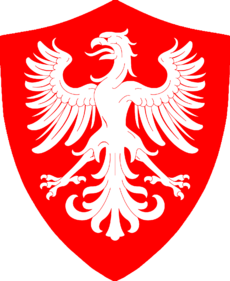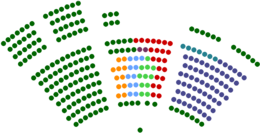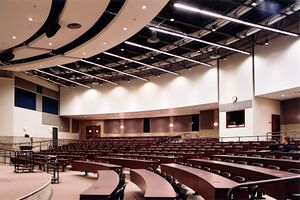Commons Council (Seketan): Difference between revisions
No edit summary |
No edit summary |
||
| Line 24: | Line 24: | ||
| leader1 = Alyia Majje | | leader1 = Alyia Majje | ||
| party1 = [[Socialist Party (Seketan)|Socialist]] | | party1 = [[Socialist Party (Seketan)|Socialist]] | ||
| election1 = | | election1 = Novermber 13, 2015 | ||
| leader2_type = Prime Minister | | leader2_type = Prime Minister | ||
| leader2 = [[Eris Kellisyen]] | | leader2 = [[Eris Kellisyen]] | ||
| party2 = [[Socialist Party (Seketan)|Socialist]] | | party2 = [[Socialist Party (Seketan)|Socialist]] | ||
| election2 = | | election2 = April 22, 2013 | ||
| leader3_type = Leader of the Opposition | | leader3_type = Leader of the Opposition | ||
| leader3 = [[Simone Laphjen]] | | leader3 = [[Simone Laphjen]] | ||
| party3 = [[National Conservative Party (Seketan)|National Conservative]] | | party3 = [[National Conservative Party (Seketan)|National Conservative]] | ||
| election3 = | | election3 = May 8th, 2020 | ||
| seats = 293 MC's | | seats = 293 MC's | ||
| structure1 = File:SekCommonsCouncil47.png | | structure1 = File:SekCommonsCouncil47.png | ||
| Line 69: | Line 69: | ||
The chamber has 293 members elected every 4 years, with 193 elected by FPTP in single member districts with roughly equal population and 100 elected proportionally in at-large province wide constituencies. Members of the Council, or MC's group themselves into political parties, with a minimum requirement of 10 members to form a recognized party. MC's in groupings less then 10 can form unrecognized parties and sit with other non-affiliated MC's. The Speaker can choose to lower the minimum requirements at anytime. | The chamber has 293 members elected every 4 years, with 193 elected by FPTP in single member districts with roughly equal population and 100 elected proportionally in at-large province wide constituencies. Members of the Council, or MC's group themselves into political parties, with a minimum requirement of 10 members to form a recognized party. MC's in groupings less then 10 can form unrecognized parties and sit with other non-affiliated MC's. The Speaker can choose to lower the minimum requirements at anytime. | ||
Since the [[2020 Seketese General Election|2020 Election]] there is a | Since the [[2020 Seketese General Election|2020 Election]] there is a Socialist Party majority government led by [[Eris Kellisyen]], with the National Conservative Party forming the main oppostion led by [[Simone Laphjen]]. | ||
=History= | |||
The Commons Council has its roots in the early councils of the [[Kingdom of Seketan]], with monarchs assembling adhoc advisory bodies or "Hérvynsken" of nobels and local leaders from time to time, primarily during war. These Kings Councils were non-permanent and would often be dissolved as soon as their usage had expired and had no real political power compel the monarch to take action. | |||
In 1537 several mayors and regional leaders decided to withhold taxes from [[King Fejer IV]], demanding reform to the Seketese government system with a permanent body for them to advise the monarch, starting the [[Nobel Revolt]]. King Fejer IV gave into their demands and convened the first Hérvynsken in 1540 in Conelibek with the power to grant tax money to the King, raise additional armies and appoint a Speaker to convay the councils wishes to the monarch, modeled after the Speaker in England. The council was not intitially elected, with towns choosing to send representatives chosen by their local mayor. This sometimes led to confusion as there was no rules governing who has the authority to send these delegates, and often competeing delegates were sent from the same area leading to fights. | |||
After the personal union with Alquiya was established in 1789, more reforms were brought to the council. First, rules were established regaridng membership to the council. Any town with over 5,000 people were granted the right to send a represntive or Member of Council (MC) through whatever means the town chose. Some towns chose to elect their MC's while others were appointed by the mayor or local town boards. Secondly, the chamber was granted additional legislative powers such as the right to create a national budge and raise new forms of taxation. The chamber could also appoint a | |||
Revision as of 20:14, 20 December 2020
This article is incomplete because it is pending further input from participants, or it is a work-in-progress by one author. Please comment on this article's talk page to share your input, comments and questions. Note: To contribute to this article, you may need to seek help from the author(s) of this page. |
Commons Council | |
|---|---|
| 47th Session | |
 | |
| Type | |
| Type | Lower House of the Hérvynsken |
| History | |
| Founded | 1799 |
| Leadership | |
Speaker | Alyia Majje, Socialist since Novermber 13, 2015 |
Prime Minister | |
Leader of the Opposition | |
| Structure | |
| Seats | 293 MC's |
 | |
Political groups | Government (167)
Opposition (126)
|
| Elections | |
| |
Last election | March 6, 2020 |
Next election | Before March 4, 2024 |
| Meeting place | |
 | |
| Hérvynsken Building Government District, Conelibek, Seketan | |
The Commons Council or blank is the lower house of the Seketese Hérvynsken. It is the only directly elected body in the Federal Government and is the primary legislative body in the Hérvynsken. It meets in the North end of the Hérvynsken Buildings in the Allis Room. The councils modern authority is established in the Seketese Constitution under Article 3, Section 2 in 1972 after the Seketese Revolution reformed the Hérvynsken's powers. Currently its the primary house of the Hérvynsken with the power to elect the Prime Minister.
At the beginning of each session the house elects a Speaker to preside over debates and votes. Currently the Speaker is Alyia Majje of the Socialist Party who is the first female Speaker and was first elected to the seat in 2015. The Speaker is assisted by 3 deputies, who are currently Jacob Hesek of the National Conservative Party, Rejina Makolta of the Labour Party and Paal Dhi of the Liberal Democratic Party.
The chamber has 293 members elected every 4 years, with 193 elected by FPTP in single member districts with roughly equal population and 100 elected proportionally in at-large province wide constituencies. Members of the Council, or MC's group themselves into political parties, with a minimum requirement of 10 members to form a recognized party. MC's in groupings less then 10 can form unrecognized parties and sit with other non-affiliated MC's. The Speaker can choose to lower the minimum requirements at anytime.
Since the 2020 Election there is a Socialist Party majority government led by Eris Kellisyen, with the National Conservative Party forming the main oppostion led by Simone Laphjen.
History
The Commons Council has its roots in the early councils of the Kingdom of Seketan, with monarchs assembling adhoc advisory bodies or "Hérvynsken" of nobels and local leaders from time to time, primarily during war. These Kings Councils were non-permanent and would often be dissolved as soon as their usage had expired and had no real political power compel the monarch to take action.
In 1537 several mayors and regional leaders decided to withhold taxes from King Fejer IV, demanding reform to the Seketese government system with a permanent body for them to advise the monarch, starting the Nobel Revolt. King Fejer IV gave into their demands and convened the first Hérvynsken in 1540 in Conelibek with the power to grant tax money to the King, raise additional armies and appoint a Speaker to convay the councils wishes to the monarch, modeled after the Speaker in England. The council was not intitially elected, with towns choosing to send representatives chosen by their local mayor. This sometimes led to confusion as there was no rules governing who has the authority to send these delegates, and often competeing delegates were sent from the same area leading to fights.
After the personal union with Alquiya was established in 1789, more reforms were brought to the council. First, rules were established regaridng membership to the council. Any town with over 5,000 people were granted the right to send a represntive or Member of Council (MC) through whatever means the town chose. Some towns chose to elect their MC's while others were appointed by the mayor or local town boards. Secondly, the chamber was granted additional legislative powers such as the right to create a national budge and raise new forms of taxation. The chamber could also appoint a